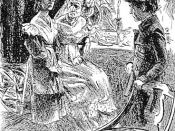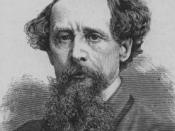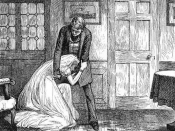Realism was developed by the middle of the 19th century as a response to the idealistic world of romanticism which had dominated for the past half century. It was an aesthetic movement which attempted to hold up a mirror to its society to show a true reflection of reality. Although claiming to offer a slice of life by emphasizing chiefly in the importance of the ordinary amongst the middle and lower classes, realism is a relative concept, a representation of reality which adheres to a loose collection of conventions. Many of these are offered in Charles Dickens' Great Expectations, which follows the life and struggles of the protagonist and narrator, Pip. Dickens uses techniques such as a chronological linear narrative, an omniscient narrator, the celebration of the ordinary, and the resolution of the enigma to drive the moral undercurrents of Pip's everyday existence. This constructed realism is essentially a representation of reality based on Dickens ideology, offering social commentary and reflecting the values and attitudes of nineteenth century England.
The basic structure of Great Expectations follows a chronological development of Pip's life; from his childhood innocence, to his disillusioned expectations, finally his rejection of the high life and a circular succession ending back at the beginning. This chronological structure of which Dickens narrates exemplifies Pip's learning process through his moral and emotional turmoil and complies with the opportunity to generate a realistic setting. For example, Pip's description of London, "a most dismal place; the skylight eccentrically patched like a broken head, and the distorted adjoining houses looking as if they had twisted themselves to peep down at me through it," creates an archaeologically realistic description of London, and hints a sense of foreboding, foreshadowing the futility of Pip's expectations. This ideology developed through...


